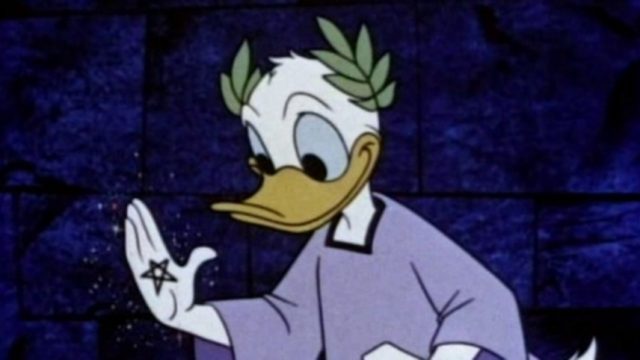My original plan for this column was to stick to the live action stuff. Actually, I was contemplating doing all the live action movies in chronological order, but that would have gotten very difficult very quickly. And expensive. The more I thought about it, the more I realized that what I really wanted to do was talk about some of the stuff you don’t hear as much about, animated or live action or mixed, feature-length or short. (Yeah, I’ll probably get to the Alice shorts at some point.) And, okay, mostly I want to talk about stuff that either I already own or that I’ve wanted an excuse to buy. But I’ve realized that, yes, there’s a lot of stuff that is worth hearing about that doesn’t fit my original plan.
Which brings us to the short “Donald in Mathmagic Land.” Possibly also known as “the Disney cartoon you’re most likely to watch in school unless you take drivers’ ed.” At twenty-seven minutes, it’s on the long side for a short, but still. We start with Donald exploring a strange land that rapidly gets all mathy. Then, a mysterious voice, Paul Frees, introduces itself as the True Spirit of Adventure and tells him that they’re going to explore the wonderland of mathematics. Donald is less than impressed.
I think part of what this short does is answer the question “When am I ever going to use this stuff?” We start with Pythagoras and how math influences music. We learn about the pentagram, the golden section, the golden rectangle, and so forth. Those naturally segue into art, architecture, proportions in nature. How these ratios influence our perceptions of beauty. From there into games, into the real-life applications of conic sections, and into using mathematics to play games in the mind.
This short would play at irregular intervals on the Disney Channel. Of course, they never made a big deal about it; you’d know either because you’d stumble across it in the TV listings or because you’d stumble across it while channel-surfing, You couldn’t exactly schedule a viewing of this unless you were the sort of person who’d flip through the TV listings in advance. Which, um, I sometimes would.
Despite my thirty-year fondness of it, though, I’m still not much of a math person. However, it may be at least part of why I respect math as much as I do. I don’t enjoy it, and once you get beyond a certain level, I’m not terribly good at it. But I respect it and its uses, and perhaps that’s because of Donald and “Mr. Spirit” walking me through all sorts of places where math is used when I was young enough to be influenced by that sort of thing.
I mean, I wouldn’t necessarily choose the things they did to highlight. The billiards section is a bit long, though I suppose it is at that a decent enough portrayal of the importance of, say, knowing how to calculate angles. If the short were made even five years later, in 1964 instead of 1959, you’d probably have at least a bit in there about the importance of math to computers. Trajectories, maybe, and how math drove the space program. Sure, anyone can play billiards, but getting men to the Moon is maybe a little more inspiring.
And, for the first time since we’ve started this series, we’ve come across a Disney Oscar nominee. The Academy’s statistics list Walt Disney with 59 nominations; that appears to be how many times Walt, personally, was nominated, though the only nominee with more is simply MGM. At any rate, he won 26, and since that appears at the top of both the “Persons With 4 or More Academy Awards” list and the “Most Awards” list, I think we can take it as read that the nominations are to Walt, personally, not to the studio. Not that it broadly matters; while he did win 22 competitive Oscars aside from the honorary stuff, they were all as producer. So he was personally collecting awards going to the studio in categories like Short Subject (Cartoon) and Short Subject (Two-Reel). And Best Picture, for Mary Poppins.
What’s interesting, though, is that this is one of either two or three, depending on how you look at it, times that Disney, whether you think of it as man or studio, was nominated in the Documentary Short Subject category with an animated short. The winner that year was an eleven-minute short called simply “Glass,” about glassblowing in the Netherlands; in 1942, despite two nominees in the category, Walt lost in a four-way tie to several documentaries celebrating our allies. There were twenty-five nominees in the category that year.
It’s a lovely short on a lot of levels, and definitely the sort of thing that you should show your kids, should you have kids, to get them to understand the value of math, whether they like math or not. I’m honestly not always a fan of Disney cartoons starring the company’s most popular characters; Mickey has frankly spent a lot of years kind of boring. However, I think anyone who insists that the dumbing-down of America is a new trend should recognize that Donald’s dismissive “that’s for eggheads!” when encouraged to learn about math was not exactly an unusual response in those last days before the Space Race heated up. Remember, after all, that the term may well have helped keep Adlai Stevenson out of the White House.

